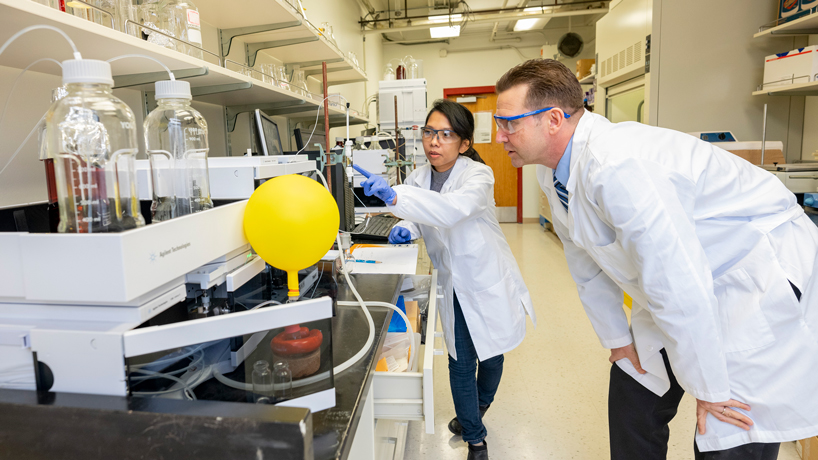
Outsourcing research often makes more fiscal sense than hiring, training, running experiments and disposing of waste. (Photo by August Jennewein)
There are times when any company has a need beyond its own capacities.
Mark Carrier, vice president of engineering for new product development at Nidec Corporation, recalls developing a high-altitude drone for an industry client. He needed to conduct testing to ensure the materials would survive harsh conditions 80,000 feet up in the air.
He had a problem: Nidec didn’t have the correct resources in-house to get that done. So Carrier turned to researchers at a local university.
That wasn’t the first time he’d looked outside Nidec for expertise.
“In any company, there’s always a lack of resources to work on projects or a lack of expertise in a certain area,” Carrier said. “It’s really nice to tap into a large university base and be able to get that kind of information. It’s good for industry.”
Carrier and other advisors from Nidec as well as Bayer Crop Science, Mallinckrodt Pharmaceuticals and MilliporeSigma have partnered with the University of Missouri System and the Southern Illinois University System to make finding researchers simpler and better. Their efforts, led by staff at the University of Missouri–St. Louis, created Research Enabled, an online portal that facilitates matches between industry needs and research solutions.
“Fresh insight, lower cost”
Outsourcing research often makes more fiscal sense than hiring, training, running experiments and disposing of waste.
Carrier points out that hiring often means figuring out how to maintain an asset after the project has been completed, and that can be expensive. Using a university researcher means that a company can obtain quality work from a highly qualified individual without that obligation.
“It’s a constant decision that businesses are making all the time,” Research Enabled Director Jay De Long said. “They might outsource research because it’s a second priority, because its expertise that lays outside the core business. Maybe they don’t want to build up capacity but just need to tag it for one project or another. Fresh insight, lower cost – there’s a whole host of reasons.”
Quality solutions for needs large and small
The Research Enabled portal breaks down barriers so that businesses seeking expertise can post a request for proposal and have quality responses from a pool of over 4,000 researchers fast – three months for a complex RFP or much sooner for simpler needs, such as materials testing.
“We used to have to call a university and say, ‘We have this particular project,’” Carrier said. “Research Enabled really puts it at the fingertips.”
Businesses can also search by specific research expertise or facility. Tamara Wilgers, director of the UMSL Office of IP Management and Commercialization, notes that businesses might simply want access to scientific equipment that’s too costly or impractical to have in-house such as a scanning electron microscope or even a nuclear reactor.
Another benefit of Research Enabled is that businesses have an opportunity to see and partner with current university research that’s ripe for commercialization.
“It maximizes opportunity, capacity and matches resources with needs in a quick and inexpensive way,” De Long said. “Businesses can be more agile and faster to market at a lower cost.”
Industry and discipline agnostic
Although often it’s companies related to the hard sciences that look to universities to fill research needs, any business in any industry can find needed expertise and resources in academia.
“For example, UMSL has fantastic capacity in mental health research and program evaluation, logistics, international business and several other areas,” Wilgers said. “Companies and organizations can look to universities to address a wide range of business needs that go beyond traditional research. We have designed Research Enabled to be as industry agnostic as possible.”
The flipside of that is that RFPs can be left open to proposals from any discipline, which often results in innovative solutions from unexpected places.
Businesses of any size can tap into university expertise, and Wilgers says that it’s equally common for large corporations such as Monsanto as well as startups to reach out.
Workforce development
University researchers frequently employ students, thus providing businesses with the opportunity to come in contact with potential future employees and evaluate their skills, expertise and work ethic.
“You get to meet very talented students,” Carrier said. “A lot of times, we end up hiring these young engineers when we have an opening.”
The more real-world experience students gain solving industry problems, the better able and trained they will be to hit the ground running after graduation. That means a robust workforce pool for companies to hire from in the greater St. Louis region.
Being able to hire local incentivizes individuals to stay and make their home in St. Louis, perpetuating a strong local workforce and an elevated regional economy.
Research Enabled allows businesses and industries of all sizes to engage with university researchers, experts and resources. Learn more at: https://www.researchenabled.org.
This story originally appeared in the St. Louis Business Journal’s Rise Up for St. Louis content hub, sponsored by the University of Missouri–St. Louis.














